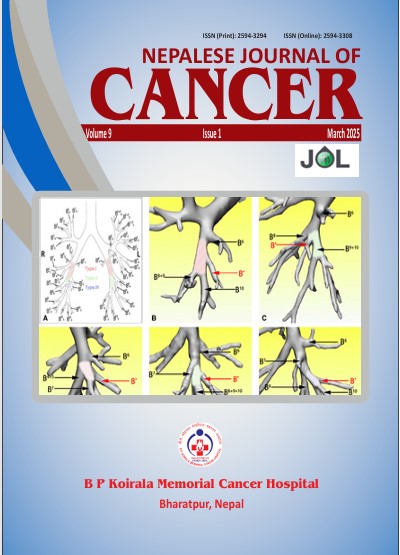Outcome of Etoposide Carboplatin versus etoposide cisplatin in the treatment of extensive stage small cell lung cancer: a Quasi Experimental study
DOI:
https://doi.org/10.3126/njc.v9i1.77088Keywords:
cisplatin, carboplatin, small cell carcinoma, treatmentAbstract
Introduction: Small Cell Lung Cancer (SCLC) represents 15% of lung cancers, typically presenting in the central airways and rapidly metastasizing. It is closely linked to smoking, with various factors affecting survival, including tumor size, metastasis, and age. Chemotherapy, particularly platinum-based regimens like Cisplatin-Etoposide (EP), is the standard treatment, though its toxicities limit its use. Etoposide-Carboplatin offers a less toxic alternative, especially for elderly patients. This study compares the efficacy and toxicity of Etoposide-Carboplatin versus Etoposide-Cisplatin in Extensive-Stage SCLC patients in Bangladesh.
Methods: A quasi-experimental study was conducted at BSMMU and NICR&H in Dhaka, Bangladesh. Seventy patients with extensive-stage SCLC were enrolled, receiving either Etoposide-Carboplatin (ARM A) or Etoposide-Cisplatin (ARM B). Sample size calculation was based on toxicity rates, yielding 35 patients per arm. Treatment response was evaluated using RECIST criteria, and hematological and non-hematological toxicities were assessed.
Results: Treatment responses showed no significant difference between arms, with partial response observed in 65.7% (ARM A) and 77.1% (ARM B) after 3 cycles (p=0.136). Toxicities were more prominent in ARM A, particularly in leucopenia and nausea/vomiting. Statistically significant differences were found in leucopenia (p=0.0158), with more severe cases in ARM B. No significant differences were observed in neuropathy, hypersensitivity, or kidney injury.
Conclusion: Both Etoposide-Carboplatin and Etoposide-Cisplatin regimens demonstrate comparable efficacy in treating Extensive-Stage SCLC. However, Etoposide-Cisplatin was associated with fewer toxicities, particularly in terms of hematological and gastrointestinal side effects. These findings suggest that Etoposide-Cisplatin may be preferable for certain patient populations, particularly those at risk for chemotherapy-related toxicities.
Downloads
Downloads
Published
How to Cite
Issue
Section
License
Copyright (c) 2025 Nepalese Journal of Cancer

This work is licensed under a Creative Commons Attribution 4.0 International License.
This license lets others distribute, remix, tweak, and build upon your work, even commercially, as long as NJC and the authors are acknowledged.
Submission of the manuscript means that the authors agree to assign exclusive copyright to NJC. The aim of NJC is to increase the visibility and ease of use of open access scientific and scholarly articles thereby promoting their increased usage and impact.




